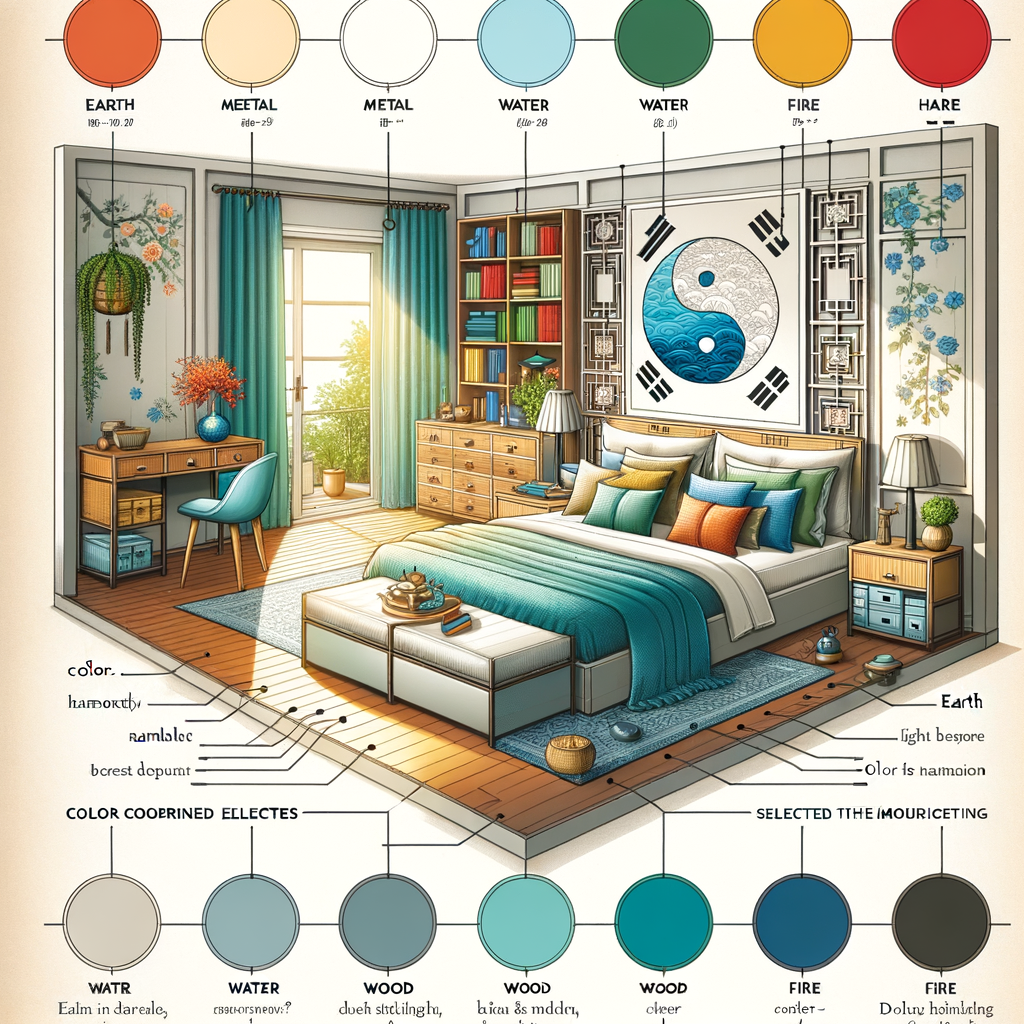
Feng Shui: An Introduction
Welcome to the fascinating world of Feng Shui, an ancient Chinese practice that aims to harmonize individuals with their surrounding environment. This introductory guide will help you understand the basics of Feng Shui and its importance in home design.
-
Understanding Feng Shui
Feng Shui, pronounced as ‘Fung Shway’, is a 3,000-year-old art and science developed in China. The term translates to ‘Wind’ (Feng) and ‘Water’ (Shui), two natural elements that flow and circulate everywhere on Earth. Feng Shui is based on the Taoist vision and understanding of nature, particularly on the idea that the land is alive and filled with Chi, or energy.
The main goal of Feng Shui is to harness this energy and create harmony between an individual and their environment. It is believed that when the energy in our environment is balanced, it brings good fortune, health, and prosperity.
-
The Importance of Feng Shui in Home Design
Home is where we spend a significant part of our lives. It’s where we relax, recharge, and create memories. Therefore, the energy in our homes can greatly influence our mood, health, and overall well-being. This is where Feng Shui comes into play.
By applying Feng Shui principles in home design, we can create a more peaceful, harmonious, and positive environment. For example, the placement of furniture, the choice of colors, and the direction of the house can all impact the flow of Chi. A well-designed Feng Shui home can bring about a sense of calm, inspire productivity, and even improve relationships.
Here’s a simple table to illustrate some basic Feng Shui principles for home design:
Principle Description Command Position Place important furniture like the bed or desk in a position where you can see the door but not in direct line with it. Five Elements Balance the five elements (Wood, Fire, Earth, Metal, and Water) in your home to create a vibrant, energetic space. Clutter-Free Keep your home free of clutter. Clutter blocks the flow of Chi and can lead to stagnation in life.
As we delve deeper into the world of Feng Shui in the following sections, you will learn more about how to apply these principles in specific areas of your home, starting with the bedroom. Stay tuned!
Feng Shui Rules for Bedroom
Creating a harmonious environment in your bedroom is essential for a good night’s sleep and overall well-being. One way to achieve this is by following the principles of Feng Shui, an ancient Chinese art that focuses on balancing energies in a given space. Here are some general Feng Shui rules for the bedroom.
General Feng Shui Bedroom Rules
- Rule 1: Position Your Bed Correctly
- Rule 2: Keep the Bedroom Clutter-Free
- Rule 3: Choose Appropriate Bedroom Decor
The placement of your bed is crucial in Feng Shui. It should be placed diagonally across from the door, but not in direct line with it. This position, known as the “commanding position,” allows you to see the door without being directly in its path, promoting a sense of security and control.
Clutter disrupts the flow of positive energy, or “chi,” in your bedroom. To maintain a harmonious environment, keep your bedroom tidy and organized. Regularly clean and declutter your space, ensuring items have a designated spot. This practice not only promotes good Feng Shui but also contributes to a peaceful and relaxing atmosphere.
The decor in your bedroom should promote tranquility and relaxation. In Feng Shui, it’s recommended to use calming colors like blues, greens, and earth tones. Avoid having too many electronic devices, as they can disrupt the peaceful energy. Also, consider incorporating elements of nature, such as plants or artwork depicting landscapes, to enhance the flow of positive energy.
By following these general Feng Shui rules, you can create a bedroom that promotes restful sleep and positive energy. Remember, the goal of Feng Shui is to create a balanced and harmonious environment, so feel free to adjust these rules to suit your personal preferences and needs.
Feng Shui Bedroom Design
Creating a harmonious environment in your bedroom is essential for a good night’s sleep. This is where Feng Shui comes into play. Let’s delve into the process of designing a Feng Shui bedroom and explore some examples.
- Designing a Feng Shui Bedroom
- Examples of Feng Shui Bedroom Designs
Designing a Feng Shui bedroom is all about balance and harmony. The bed should be placed in a commanding position, which means you can see the door from the bed, but you’re not directly in line with it. Avoid placing the bed under a window or sloping ceiling. Keep the room clutter-free and use soothing colors like blue, green, or lavender.
Lighting is also crucial in a Feng Shui bedroom. Natural light is the best, but if that’s not possible, use soft, warm lighting. Avoid harsh overhead lights. Mirrors should be used sparingly, and not placed where they can reflect you while you sleep.
Finally, the air quality in your bedroom is important. Keep windows open as much as possible, or use an air purifier. Plants can also help improve air quality, but avoid having too many, as they can disrupt your sleep.
Let’s look at some examples of Feng Shui bedroom designs. One example is a bedroom with a bed placed diagonally across from the door, with a solid headboard and a nightstand on each side. The room is painted in a soothing blue color, with minimal clutter and soft lighting.
Another example is a bedroom with the bed placed against a solid wall, with the door visible from the bed. The room is painted in a calming green color, with a small mirror placed on the wall opposite the bed. The room is kept clutter-free, with an air purifier and a single plant for better air quality.
Designing a Feng Shui bedroom might seem complex at first, but once you understand the basic principles, it becomes a fun and rewarding process. Remember, the goal is to create a peaceful and harmonious environment that promotes a good night’s sleep.
Selecting Bedroom Colors: Feng Shui Guidelines
Choosing the right colors for your bedroom can be a daunting task. However, by following Feng Shui guidelines, you can create a harmonious and balanced environment that promotes restful sleep and positive energy.
Feng Shui Color Selection
When it comes to selecting Feng Shui colors for your bedroom, there are two key aspects to consider:
- How to Choose Feng Shui Colors for Bedroom
- Understanding Feng Shui Color Meanings
Choosing Feng Shui colors for your bedroom involves understanding the energy you want to create. For a peaceful and calming environment, consider using blues, greens, and pastels. If you want to promote romance and passion, reds and pinks are ideal. Remember, the goal is to create a balanced and harmonious space.
Each color in Feng Shui has a specific meaning and can influence the energy in your space. For example, blue represents tranquility and calmness, while red symbolizes passion and power. Understanding these meanings can help you select the right colors for your bedroom.
Remember, Feng Shui is all about balance and harmony. Therefore, it’s important to choose colors that not only suit your personal taste but also promote the type of energy you want in your bedroom.
Now that you understand how to select Feng Shui colors for your bedroom and the meanings behind them, you can create a space that promotes restful sleep and positive energy.
Feng Shui Bedroom Color Guide
Choosing the right colors for your bedroom according to Feng Shui principles can greatly influence your mood, sleep quality, and overall well-being. Let’s delve into the best and worst Feng Shui colors for your bedroom.
- Best Feng Shui Colors for Bedroom
- Worst Feng Shui Colors for Bedroom
According to Feng Shui, the best colors for your bedroom are those that match your personal element. However, some colors are universally accepted as beneficial for creating a serene and restful environment.
| Color | Feng Shui Element | Effect |
|---|---|---|
| Light Blue | Water | Calming and peaceful, promotes tranquility and relaxation. |
| Green | Wood | Brings balance, healing and rejuvenation, perfect for a restful sleep. |
| Light Yellow | Earth | Creates a cozy, welcoming atmosphere, promotes stability and groundedness. |
Remember, the best Feng Shui bedroom colors are the ones that make you feel the most relaxed and peaceful.
Just as there are colors that promote relaxation and tranquility, there are also colors that Feng Shui suggests avoiding in the bedroom. These colors can disrupt sleep, cause restlessness, or even stir up negative emotions.
| Color | Feng Shui Element | Effect |
|---|---|---|
| Red | Fire | Too stimulating, can cause restlessness and increase heart rate. |
| Black | Water | Can create feelings of heaviness or depression when used excessively. |
| White | Metal | Can feel cold and unwelcoming if used without balance. |
While these are general guidelines, it’s important to remember that everyone’s energy and reactions to colors can be different. Listen to your own feelings and intuition when choosing your bedroom colors.
Feng Shui Principles for Bedroom Colors
Choosing the right colors for your bedroom is not just about personal preference. It’s also about creating a harmonious and balanced environment that promotes relaxation and restful sleep. This is where the principles of Feng Shui come in.
Feng Shui Color Rules
Feng Shui, an ancient Chinese practice, uses color to create a balance of energy, or Chi, in a space. Each color is associated with one of the five elements of Feng Shui – Wood, Fire, Earth, Metal, and Water. Understanding and applying these color rules can help create a more peaceful and balanced bedroom environment.
- Understanding Feng Shui Color Rules
- Applying Feng Shui Color Rules in the Bedroom
Each color in Feng Shui represents a different element and has a different impact on the energy of a room:
| Color | Element | Impact |
|---|---|---|
| Green | Wood | Promotes growth and vitality |
| Red | Fire | Stimulates and energizes |
| Yellow | Earth | Nurtures and stabilizes |
| White | Metal | Clarifies and purifies |
| Blue | Water | Calms and soothes |
When selecting bedroom colors, consider the energy you want to cultivate. For example, if you want a calming and relaxing space, consider blues or greens. If you want to stimulate passion and energy, consider reds. Remember, balance is key. Too much of any one color can create an imbalance of energy.
In conclusion, understanding and applying Feng Shui color rules can help create a bedroom environment that promotes balance, harmony, and well-being. Experiment with different colors and observe how they impact your mood and energy. Remember, the most important thing is that your bedroom feels like a sanctuary to you.
Feng Shui Bedroom Color Selection Rules
Understanding the principles of Feng Shui can greatly influence the energy flow in your bedroom. One of the key elements in this ancient Chinese practice is color selection. The colors you choose for your bedroom can either enhance or disrupt the balance of energy. Let’s explore how to apply these color selection rules in your bedroom and look at a case study for a better understanding.
- How to Apply Feng Shui Color Selection Rules in the Bedroom
- Identify the Energy You Want: The first step is to identify the type of energy you want to invite into your bedroom. For instance, if you want a calming energy, blue or green would be suitable as they represent the water and wood elements respectively.
- Choose the Right Shade: The shade of the color also matters. Lighter shades tend to bring a more peaceful energy, while darker shades can create a more intense energy.
- Consider the Room’s Location: The location of your bedroom in relation to the rest of your house can also influence the best color choice. For example, a bedroom in the east might benefit from green tones, which represent growth and new beginnings.
- Case Study: Feng Shui Bedroom Color Selection
In Feng Shui, each color represents a different element and has a unique energy. Here are some steps to apply these rules:
Let’s look at a case study to better understand the application of these rules. John and Mary, a couple living in a suburban home, wanted to improve the energy in their master bedroom. They decided to apply Feng Shui color selection rules.
They identified that they wanted a calming and peaceful energy in their bedroom. After considering the room’s location in the northeast part of the house, they chose a light blue color, representing the water element known for its calming properties.
After repainting the room, John and Mary reported a noticeable improvement in their sleep quality and overall mood. This case study demonstrates the potential impact of applying Feng Shui color selection rules in the bedroom.
In conclusion, the color selection in your bedroom can significantly influence the energy flow according to Feng Shui principles. By understanding and applying these rules, you can create a more balanced and harmonious environment in your bedroom.
Conclusion
- Key Takeaways
- Feng Shui is an ancient Chinese practice that seeks to harmonize individuals with their surrounding environment.
- The bedroom is a crucial area in Feng Shui as it’s a place of rest and rejuvenation.
- Color selection in Feng Shui is not random. Each color has a specific energy, and the right balance can promote a sense of peace and wellbeing.
- Understanding the five elements of Feng Shui – Wood, Fire, Earth, Metal, and Water – can guide you in choosing the best colors for your bedroom.
- Final Thoughts on Feng Shui Bedroom Colors
Throughout this article, we have explored the fascinating world of Feng Shui and its impact on bedroom colors. Here are the key points to remember:
Choosing the right colors for your bedroom using Feng Shui principles can seem daunting at first. However, with the knowledge you’ve gained from this article, you’re now equipped to make informed decisions. Remember, the goal is to create a harmonious space that promotes relaxation and rest.
Whether you’re a Feng Shui beginner or a seasoned practitioner, we hope this guide has been helpful. As you embark on your Feng Shui journey, remember that the most important thing is to create a space that feels right to you. After all, your bedroom is your sanctuary, and it should reflect your personal style and preferences.













